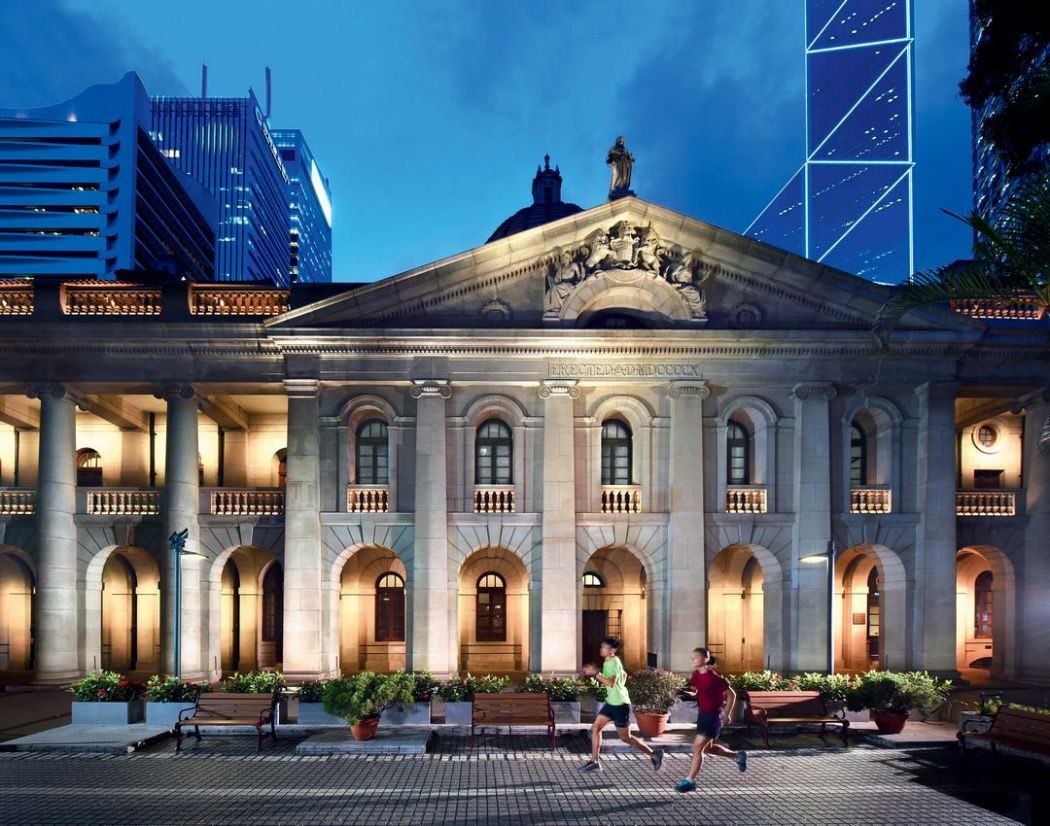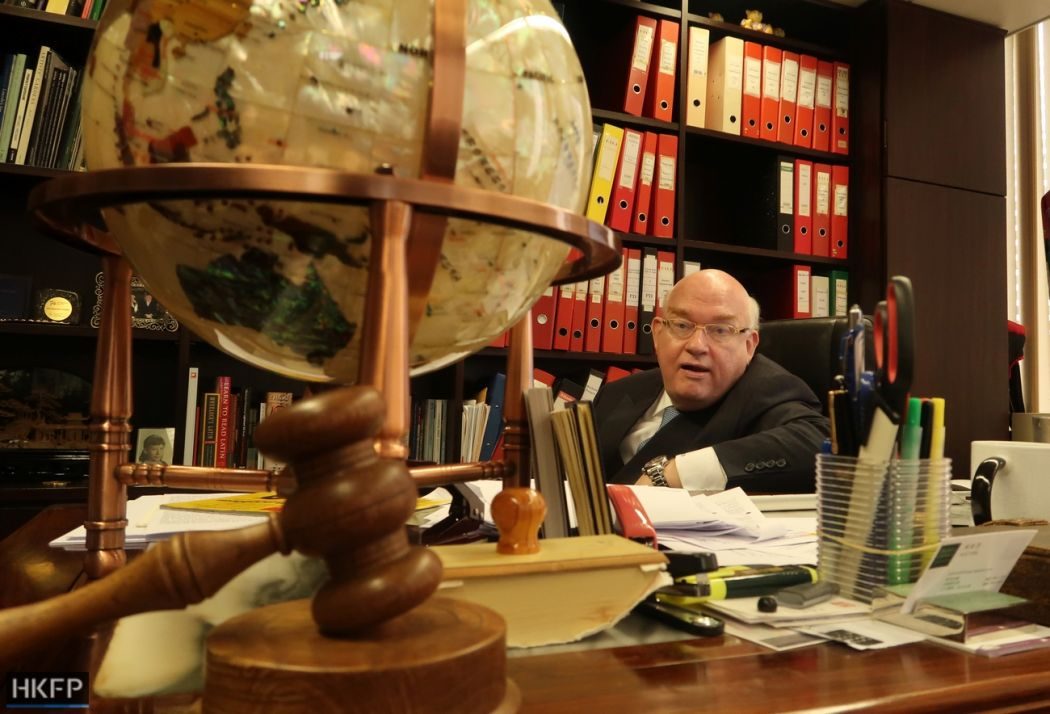Hong Kong’s legal profession has voiced concerns about the rise of public sentiments against the judicial review system, which has become a target in the city’s increasingly polarised political climate.
Senior Counsel Philip Dykes, one of the city’s top public law lawyers, warns that the trend will have a negative impact on Hong Kong’s rule of law in the long run.

“There have always been people grumpy over judicial review in particular cases, but [they are] not as persistent as in the past two to three years, not as seemingly and deliberately misinforming themselves,” he told HKFP.
Dykes has witnessed the city’s changes over the past two decades. He came to Hong Kong from England in 1984 to work for the Department of Justice. After overseeing the drafting of the Bill of Rights Ordinance, Dykes left the government in 1991 to enter private practice.
Since then, he has been involved in many landmark judicial review cases, such as the 1999 Ng Ka Ling case on the right of abode of Chinese citizens with Hong Kong parents.
He also recently represented ousted lawmakers Yau Wai-ching and Nathan Law in the government’s controversial legal challenges to unseat them.
The low-profile lawyer seldom speaks to the press despite being an authoritative voice in public law. But last month, Dykes was attacked by outspoken pro-Beijing columnist Chris Wat in an oped criticising his past involvement in judicial review cases against the government.

Wat described Dykes as a “foreign” lawyer who is “active in political cases.” She also highlighted Dykes’ previous representation of elderly judicial activist Kwok Cheuk-kin. Kwok himself is frequently targeted by pro-Beijing newspapers.
The columnist echoed Beijing mouthpiece Wen Wei Po in accusing pro-democracy lawyers such as Martin Lee and Audrey Eu of using judicial reviews to fund their political activities. “How much taxpayers’ money has been spent on feeding these lawyers through political litigation?” she wrote.
Rule of law
Dykes worried that Wat’s rhetoric could have a corrosive effect on the city’s rule of law in the long run.
His colleague, barrister Stephanie Lam, also expressed concern: “People seem to mix the role of law and what lawyers do with politics, and I think that is exactly what has been driving all the misconceptions – or people that are speaking out against something as fundamental as legal aid.”
To begin with, Dykes said, barristers cannot turn down clients owing to the profession’s cab-rank rule. He said he was asked to represent the applicants because of his expertise, and “any lawyer that turns it down is not a good lawyer.”
But more importantly, judicial review plays a vital role in enabling the public to monitor the work of the government, Dykes said.

“The rule of law is the principle at which courts can declare acts of the executive or the legislature unlawful and unconstitutional.”
“Judicial review works on the basis that your individual right has been impeached,” he continued. “It is a benefit to you if the case goes your way, but it is also a benefit to the general public inasmuch as the law is made clear.”
The legal professional has stood firm behind the judicial review system. Many members – including ex-chief justice Andrew Li – stood up to former court of final appeal judge Henry Litton two years ago when he said the notion of subjecting the government to review was “totally absurd.”
Last year, Chief Justice Geoffrey Ma said decisions from judicial review cases serve as a guide to good governance, even if they may sometimes cause inconvenience.
Dykes also rejected critics’ claim that judicial review has been misused, saying that an applicant must jump through several hurdles – such as whether they have an arguable case – before their request is approved.
In fact, the High Court has never accepted more than half of applications between 2011 and 2016. The number of judicial review applications granted leave also takes up a tiny portion of the judiciary’s caseload.

Access to courts
Judicial review applicants who lack resources may seek legal aid. Critic often argue that it is a waste of public money, though they applauded cases favourable to the government, such as the recent oath row.
In response, Dykes said: “It is a half-baked and prejudiced argument. The fact is that legal aid is a requirement under the provisions of the Bill of Rights Ordinance and [in] criminal cases explicitly. It is implicitly the requirement in access to courts.” The Basic Law guarantees the right of access to the courts.

It is also unfair to accuse lawyers of benefiting from publicly funded litigation, Dykes said.
“You ask how much money is spent on healthcare budget [and] how much money goes to the pockets of doctors. That’s public money. Do they expect the doctors to work for free?” he said, adding that legal aid should be treated as a fundamental right, like health services.
He added that it is illogical to single out lawyers acting for applicants, as the government operates like a private client and its lawyers charge a market rate.
Legislature
But Dykes stressed that it is more desirable for conflicts to be resolved in the legislature rather than by way of judicial review.
“A legislative resolution of the issue represents at least a coming together of views of people who purport to represent the population,” he said.

“The fact that people have recourse to the courts can often be the result of the indifference in the legislature to tackle the problem or not treating it in a way that is appropriate. In that case, you can only go to the court.”
However, he said a balance must be struck between majority rule and minority rights.
Citing same-sex marriage as an example, Dykes said: “You can never defer to public opinion on the matter of law. You can’t say: over my dead body – we can never have same-sex marriage. The court won’t accept that, because… the law exists to protect minority interests.”
“That’s why these cases end up in court – but better in legislature,” he added, on the condition that lawmakers will debate the issue sensibly.
In his office, Dykes keeps objects that remind him of his many courtroom battles, such as calligraphy by his Vietnamese refugee clients and a court drawing by a child with learning disabilities. He lost in some of these cases, and triumphed in others.

“The law is not a perfect profession,” he said. “The law is full of compromises. It is not perfect. So there is no perfect justice.”
“But a good lawyer can recognise a perfect injustice, and that would be the case if you could no longer go to courts and have someone argue your case.”

